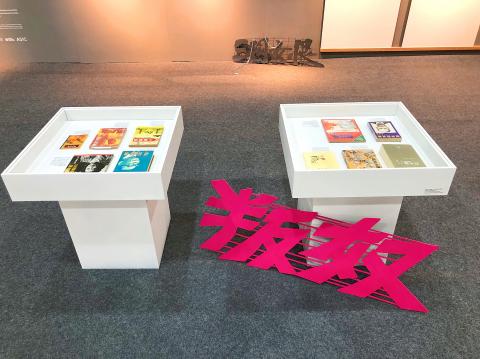Books that were banned in Taiwan during the White Terror era were displayed at the Seoul International Book Fair, which closed yesterday.
The Taipei International Book Exhibition Foundation contributed to the “Banned Books: Spirits from the Bamboo Grove” exhibition at the invitation of the fair, alongside publishers’ associations from Japan, Malaysia, Thailand and Turkey, as well as Seoul National University.
The chief planners of the Taiwanese content were publisher and former presidential adviser Rex How (郝明義), who is also the foundation’s managing supervisor, and Liao Wei-min (廖為民), who wrote The Story of Banned Books in Taiwan (台灣禁書的故事).

Photo courtesy of the Taipei International Book Exhibition Foundation
The organizations collaborated to display the formerly forbidden books to contextualize the history of literary censorship in Asia and to highlight the importance of freedom of the press, How said on Thursday.
Books on display were selected from the vast array of works proscribed during the White Terror era, or the period from 1949 to 1987 when the then-Chinese Nationalist Party (KMT) government ruled via martial law, he said.
The selection was a cross-section of the government’s press censorship, he said.
The government suppressed works of communist literature, such as Karl Marx’s Das Kapital and The Communist Manifesto, and books written by intellectuals who stayed in China after 1949, such as Lu Xun’s (魯迅) The True Story of Ah-Q (阿Q正傳) and Lao She’s (老社) Rickshaw Boy (駱駝祥子), he said.
The Legends of the Condor Heroes (射鵰英雄傳), a Wuxia novel — a genre of fiction about martial artists in ancient China — was banned because its author, Hong Konger Jin Yong (金庸), was suspected of having leftist sympathies and ties to Beijing, How said.
Books whose subject matter touched upon the 228 Massacre or the Japanese colonial era were banned, such as Su Ben’s (史明) Taiwan’s 400 Year History (台灣人四百年史), or books written by liberals who the government persecuted, including Lei Chen (雷震) and Yin Hai-kuang (殷海光), he said.
Chiang Kai-shek (蔣介石) and his son and successor Chiang Ching-kuo (蔣經國) also banned books by people who they held grudges against, such as Bo Yang (柏楊) and Chiang Nan (江南), he said.
Li Ai’s (李敖) books were banned because he was known for spurning authority, while An Anthology of Dangwai Literature (黨外文選) by Yao Chia-wen (姚嘉文) and Chen Chu (陳菊) was banned for being political literature originating from outside the KMT, he said.
The government also suppressed works deemed to challenge traditional sexual mores, such as sociologist Zhang Jingsheng’s (張競生) A History of Sex (性史) and Kuo Liang-hui’s (郭良蕙) The Locked Heart (心鎖), he said.

A magnitude 6.4 earthquake struck off the coast of Hualien County in eastern Taiwan at 7pm yesterday, the Central Weather Administration (CWA) said. The epicenter of the temblor was at sea, about 69.9km south of Hualien County Hall, at a depth of 30.9km, it said. There were no immediate reports of damage resulting from the quake. The earthquake’s intensity, which gauges the actual effect of a temblor, was highest in Taitung County’s Changbin Township (長濱), where it measured 5 on Taiwan’s seven-tier intensity scale. The quake also measured an intensity of 4 in Hualien, Nantou, Chiayi, Yunlin, Changhua and Miaoli counties, as well as

Taiwan is to have nine extended holidays next year, led by a nine-day Lunar New Year break, the Cabinet announced yesterday. The nine-day Lunar New Year holiday next year matches the length of this year’s holiday, which featured six extended holidays. The increase in extended holidays is due to the Act on the Implementation of Commemorative and Festival Holidays (紀念日及節日實施條例), which was passed early last month with support from the opposition Chinese Nationalist Party (KMT) and Taiwan People’s Party. Under the new act, the day before Lunar New Year’s Eve is also a national holiday, and Labor Day would no longer be limited

COMMITMENTS: The company had a relatively low renewable ratio at 56 percent and did not have any goal to achieve 100 percent renewable energy, the report said Pegatron Corp ranked the lowest among five major final assembly suppliers in progressing toward Apple Inc’s commitment to be 100 percent carbon neutral by 2030, a Greenpeace East Asia report said yesterday. While Apple has set the goal of using 100 percent renewable energy across its entire business, supply chain and product lifecycle by 2030, carbon emissions from electronics manufacturing are rising globally due to increased energy consumption, it said. Given that carbon emissions from its supply chain accounted for more than half of its total emissions last year, Greenpeace East Asia evaluated the green transition performance of Apple’s five largest final

Taiwan is to extend its visa-waiver program for Philippine passport holders for another year, starting on Aug. 1, Minister of Foreign Affairs Lin Chia-lung (林佳龍) said on Friday. Lin made the announcement during a reception in Taipei marking the 127th anniversary of Philippine independence and the 50th anniversary of the establishment of the Manila Economic and Cultural Office (MECO) in Taiwan, the Ministry of Foreign Affairs said. The decision reflected Taiwan’s commitment to deepening exchanges with the Philippines, the statement cited Lin as saying, adding that it was a key partner under the New Southbound Policy launched in 2016. Lin also expressed hope